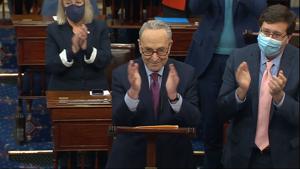Op-Ed: COVID ‘relief’ brimming with wasteful spending

Just prior to World War I, the United States were virtually debt free and often operated under a budget surplus. Then, along came Woodrow Wilson. Wilson’s deficits added roughly $22 billion to the national debt, an almost eight-fold increase from the debt with which he began his term. After a brief spell of restraint by Presidents Warren G. Harding and Calvin Coolidge – paring back the debt by roughly $6 billion over eight years – America’s lawmakers have thrown caution to the wind when it comes to spending, debts and deficits.
Today, the debt is $28 trillion, or roughly 126 percent of gross domestic product. Because the country is in the middle of a pandemic, very few lawmakers seem to care about the fiscal consequences of their actions. That is dangerous and will spell fiscal disaster for decades.
Every president since [and including] Ronald Reagan has added at least $1 trillion to the debt during their tenure, with the lone exception of Bill Clinton. In more recent years, it seems American policymakers are trying to do everything within their power to eclipse that mark in a single calendar year. The coronavirus pandemic and economic devastation that came as a result of crushing lockdowns have provided them just the cover they need to meet and exceed that goal.
The nation is reeling. To combat all that’s come our way in the last year, the federal government ran a deficit of roughly $4 trillion. This is by far the largest in the nation’s history. Now, Congress has ushered through a fresh new relief bill that will spend an additional $1.9 trillion. Proponents argue that during a crisis like this, it is not the time for austerity. There is some amount of truth to that. However, if the last century of American history has taught us anything, it’s that our politicians will break the bank in good times and bad times alike.
Even amidst these present troubles, there is ample room to be frugal where we can. Unfortunately, this bill contained hundreds of billions of dollars in wasteful spending entirely unrelated to coronavirus recovery efforts. According to the Committee for a Responsible Federal Budget, roughly 15 percent of the bill ($300B of the $1.9T) is unrelated to coronavirus. However, The Wall Street Journal editorial board estimated that only $825 billion was directly related to Covid-19 relief and $1 trillion was “expansions of progressive programs, pork, and unrelated policy changes.”
Some of the line items are particularly egregious. For example, $86 billion goes toward bailing out poorly managed pension plans. This item more than likely comes at the request of powerful unions. It does not even come with any mandates for reform or frugality. These unions will continue to mismanage their plans and will now do so with tens of billions of taxpayer dollars. Though, perhaps this should not come as a surprise given the willingness of some policymakers to let union bosses call the shots during this recovery period.
This is hardly the only example of waste. Billions are set to go to local infrastructure projects that seem more useful in serving political interests than struggling small business. New York experienced one of the most catastrophic consequences of COVID as Gov. Andrew Cuomo, D-N.Y., put infected patients in nursing homes then covered up his deeds. So, one must wonder how a bridge from New York to Canada – a funded project in this bill – will help those who have been harmed by COVID.
Billions are directed towards promoting the arts. This is perhaps a worthy objective, but not at the present time in the present bill. Lastly, well over $100 billion are dedicated to K-12 education, but won’t be dispersed until after 2022 when the pandemic should already have come to a merciful end.
Were it not for Elizabeth MacDonough – the Senate Parliamentarian – ruling it as non-germane, America would be staring at a federal minimum wage hike that would add billions to the deficit and put over a million people out of work. It is abundantly clear this legislation was never about helping the nation recover, but about boosting the political stock of those who hoped to pass it.
On top of all this, roughly $1 trillion remains unspent from previous relief packages. The nation’s lawmakers should have had the opportunity to see how this money helps and impacts recovery before running up another bill of almost $2 trillion in the meantime. Yet, the culture of instant gratification in Washington demanded fresh new funds.
Onerous coronavirus restrictions will hopefully come to an end soon. On the other side of it, our nation will have to reckon with the spending habits we acquired during the crisis and far before it. It is long past time for our leaders to start making the difficult decisions and setting up our nation for future success. Instead, bills like these leave us firmly on the path to ruin.
Disclaimer: This content is distributed by The Center Square

